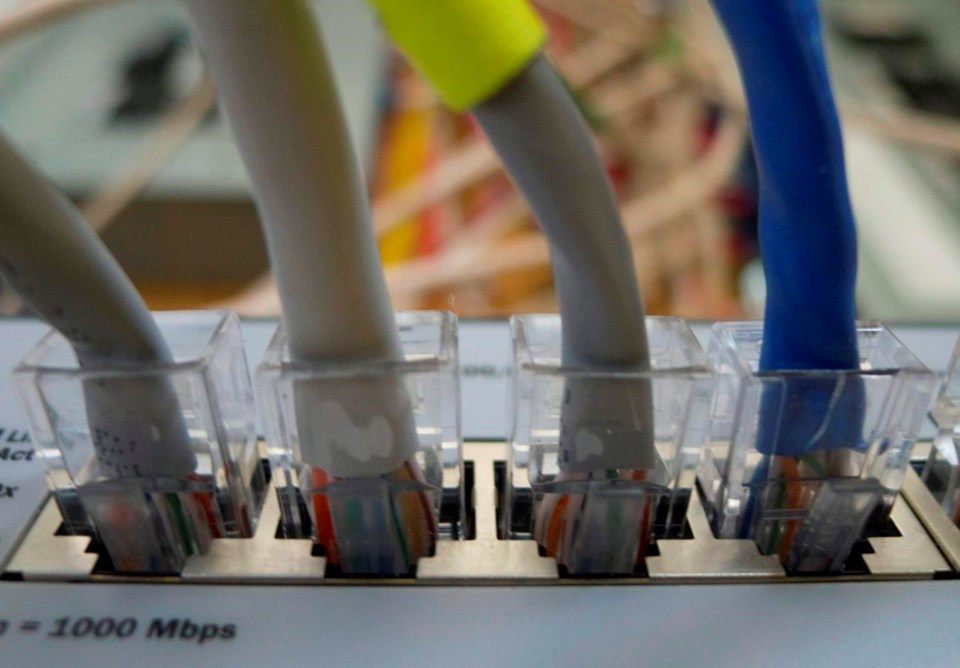IQALUIT, Nunavut — Several projects are underway to improve internet access in Nunavut, which has long been slow, unreliable and costly for many residents.
Quintillion and CanArctic Inuit Networks Inc. signed a memorandum of understanding earlier this year to build a subsea fibre optic cable network in the North American Arctic. Initially, they plan to construct a fibre line from Happy Valley-Goose Bay, N.L., to Iqaluit.
Madeleine Redfern, chief operating officer of CanArctic, a majority Inuit-owned company, said the project is "effectively shovel-ready," but requires funding. She said the goal is to complete a marine survey this summer, which would allow for construction in 2024.
"The need is immediate," she said. "Without this type of infrastructure, northerners, especially those in Nunavut, continue to pay the highest internet, telephone and cellphone services."
Redfern said improved internet access would benefit residents, businesses and the resource sector, as well as support Arctic defence efforts.
"There are so many needs and opportunities that fibre optic cable can bring into our community," she said.
A recent report on Arctic security and sovereignty by the House of Commons standing committee on national defence recommended the federal government work with Indigenous-led corporations on subsea fibre optic and other projects to provide increased and affordable internet coverage across the Arctic.
The Nunavut government has said it also plans to build an undersea fibre cable to provide faster, more reliable and affordable internet for Nunavummiut. A request for proposals for that project was cancelled without being awarded last month.
The Nunavut government said construction on the Katittuq Fibre Project, which would see a fibre line between Milton, N.L., and Iqaluit, was expected to begin this year and be completed in 2026. It said the total approved budget was $205.7 million but no eligible bids were received within that amount and the department is now updating estimates.
Nunavut is the only province or territory in Canada without access to broadband delivered by fibre cable, meaning residents are reliant on satellite, which is slower and less reliable.
An auditor general's report published earlier this year found that since Canada's connectivity plan was released in 2019, a digital divide still exists between urban, rural and remote areas. As of 2021, it found while nearly 91 per cent of households across Canada had access to minimum connection speeds, that was the case for less than 60 per cent of households in rural and remote areas — and zero in Nunavut.
“Without access to fast, reliable and affordable high-speed internet and mobile cellular service, people residing in remote communities do not have the same opportunities as people residing in more urban areas," the report states, pointing to access to education, work, and medical and government services online.
Northwestel, one of biggest internet service providers in the North, said it provides broadband service for all Nunavut communities using Telesat's Telestar 19 VANTAGE high-throughput satellite. After the satellite was deployed in July 2018, Northwestel said it would significantly improve broadband connectivity in the territory, increasing speeds to 15 megabits per second.
The federal government’s minimum high-speed internet connectivity target for all Canadians is 50 megabits per second for downloads and 10 megabits per second for uploads.
A new Inuit-controlled internet service provider says it is aiming to become the leading telecommunications service provider in Northern Canada. Panarctic Communications and Galaxy Broadbands Communications announced last month they had formed InukNet Communications Inc., promising the "fastest available internet in the North" and no fees for data overages.
The companies said they will use low Earth orbit satellites and high-powered Ka-band geostationary satellites. They plan to cover all 25 communities in Nunavut by the end of this year and expand to communities in the Northwest Territories and Nunavik region of northern Quebec in 2024.
"InukNet will provide the northern territories with state-of-the-art internet service made possible by advances in satellite technology," Harry Flaherty, president and CEO of Qikiqtaaluk Corp., which owns Panarctic, stated in a press release.
Some Nunavut residents have seen improved internet access since Starlink, which uses a low Earth orbit satellite network operated by SpaceX to deliver internet, became available in the territory late last year.
Thomas Matthew Lambe in Iqaluit has had the service for about two months. He said he prefers Starlink but has experienced some minor issues.
"It's been good to have faster streaming service, be able to play online video games, scroll through the internet so much faster," he said.
"It just feels better, but every five or 10 minutes or so, the service will cut out for about 30 seconds to about 15 minutes. And you never really know where it's gonna range."
Lambe said discussions about constructing a fibre line to Nunavut have been ongoing for a long time. He said if and when it becomes available, he may switch over to fibre, depending on the available speeds.
This report by The Canadian Press was first published May 11, 2023.
— By Emily Blake in Yellowknife
This story was produced with the financial assistance of the Meta and Canadian Press News Fellowship.
The Canadian Press



